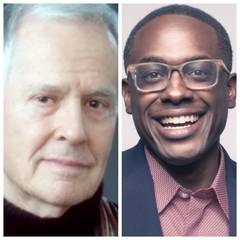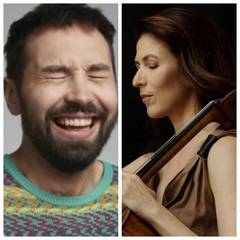|
Back
Mourning and Mysteries New York
Rose Theater, Lincoln Cemter
04/05/2023 -
Shawn E. Okpebholo: On a Poem by Miho Nonaka: ‘Harvard Square’
Mario Diaz de Leon: Mysterium
James Lee III: Ekah
Ned Rorem: Winter Pages
Adam Walker (Flute), Bixby Kennedy (Clarinet), Peter Kolkay (Bassoon), Stella Chen (Violin), Inbal Segev (Cello), Pedja Muzijevic (Piano)

N. Rorem/S. E. Okpebholo
“Composition is notation of distortion of what composers think they’ve heard before. Masterpieces are marvelous misquotations.”
Ned Rorem
Those neophytes assuming Chamber Music Society of Lincoln Center (CMS) signifies the usual plethora of Mozart, Dvorák and Brahms have been inevitably jolted into a nervous universe of the rare, the odd, and the unknown. Last night was no exception.
Perhaps the composers Shawn E. Okpebholo, James Lee III or Mario Diaz de Leon are familiar to the cognoscenti, but they meant nothing to this writer. Perhaps Ned Rorem stands for songs, hundreds of songs. Last night, a work commissioned by the CMS showed a totally different Ned Rorem, a half‑hour series of images for five instruments, not a singer among them.
And if the title of the program, “Evocations,” has multifarious meanings, the three opening works could evoke more than a multifaceted feelings amongst the full house audience at Rose Theater.
What could never be questioned is that CMS attracts the most brilliant performers for the singular challenges. The quintet last night were nothing less than astonishing. Starting with what is usually the most maudlin soloist of all, the solo flute.
Edgar Varèse was the first composer who gave honors to solo flute in his Density 21.5. Last night the Nigerian‑born Shawn Okpebholo proved “the onlie begetter” (thank, you Mr. Shakespeare) to Varèse with a paean on the Japanese poem Harvard Square. The exponent was Adam Walker, whose jaw‑dropping expertise–everything from the sounds of the bamboo Japanese flute to a whirligig of tapping and overtones–was secondary to the purity of his tone.
That purity, in fact, belied the simulated shakuhachi, an instrument whose effect depends blurred tonal nuances around the written note. Mr. Walker played the equivalent of a Japanese flute with such purity of tone that one happily ignored the feelings of the poem, which had been recited. The other parts, displayed flute‑ish sparrows, wind and tonal melodies was a thesaurus of flute‑ish miracles.
Mysterium was introduced by composer Mario Diaz de Leon, though nothing could surpass the musical-metaphysical program notes for all the music. Here, the unlikely combination of flute, bassoon and electronic sounds were not only appropriate for Holy Week, as the composer said. It was colorful listening for this listener. And one must offer a cautious catalogue of those program notes:
“Eleusinian Mysteries and C.G. Jung’s...treatise on alchemy...the sat‑nam chant of kundalini yoga...melodic flourishes inspired by the Algerian gasba flute music, the colorful noise of Ciat‑Lonbarde and Moog synthesizers...ethereal passages with tight unison gestures. ...A mystery rite evoking expansive and boundlessly connected experience.”
Whew! Yet while one suspects a Perelman or Borges joke, Mr. Diaz de Leon was probably severely serious. Yes while I have studied the background of Eleusinian mysteries, their whole reason of existence was a secret. And this reference to the Algerian gasba? In Algeria the gasba is a citadel, an Acropolis, an Al Hambra.
Still, this was (blush) fun listening. Bassoon, clarinet and flute a colorful joy.

A. Walker/I. Segev (© Christa Holka)
That splendid Israeli cellist Inbal Segev joined pianist Pedja Muzijevic for one more graphically annotated duet entitled Ekah, the Hebrew word for “How?”. (Who knew?). References to the Old Testament prophets, lamentation, queries depicted with a episodes of cantilenas, sharp turns, and finally notes of consolation, a virtual amen. Would we have thought that this was James Lee III’s manifestation of Jewish lamentation? The written notes imply a more universal mourning, a universal plaint only incidentally wept by the rivers of Babylon.
With the second half, we were on more recognizable ground. Ned Rorem had been commissioned in 1981 by CMS for Winter Pages, and came within a few months of 100 years to hear it last night. Never mind. With the addition of Strad‑playing violinist Stella Chen, the artists presented a 12‑part 30‑minute piece of poetic creation.
The titles by Mr. Rorem–“Around the House the Flakes Fly Faster”, “Urged by earnest Violins”, “Storm Snowballs” and the final “Still Life”–give momentary intimations of the instrumental diversity. Here Mr. Rorem produced an old‑fashioned waltz for clarinet and piano, cadenzas by fiddle or bassoon or cello, a starting mirrored image giving musical indications of proceeding themes.
Winter Pages was, in a way, typical Rorem. Fluid, limpidly constructed, clear, the obvious spawn of a creative lifetime spent in the Parisian cradle of Les Six. Still, what was wrong with that? Inspiration can be agonizing or god‑assembled. Ned Rorem took the second path, And the CMS players did him well‑deserved justice.
Harry Rolnick
|